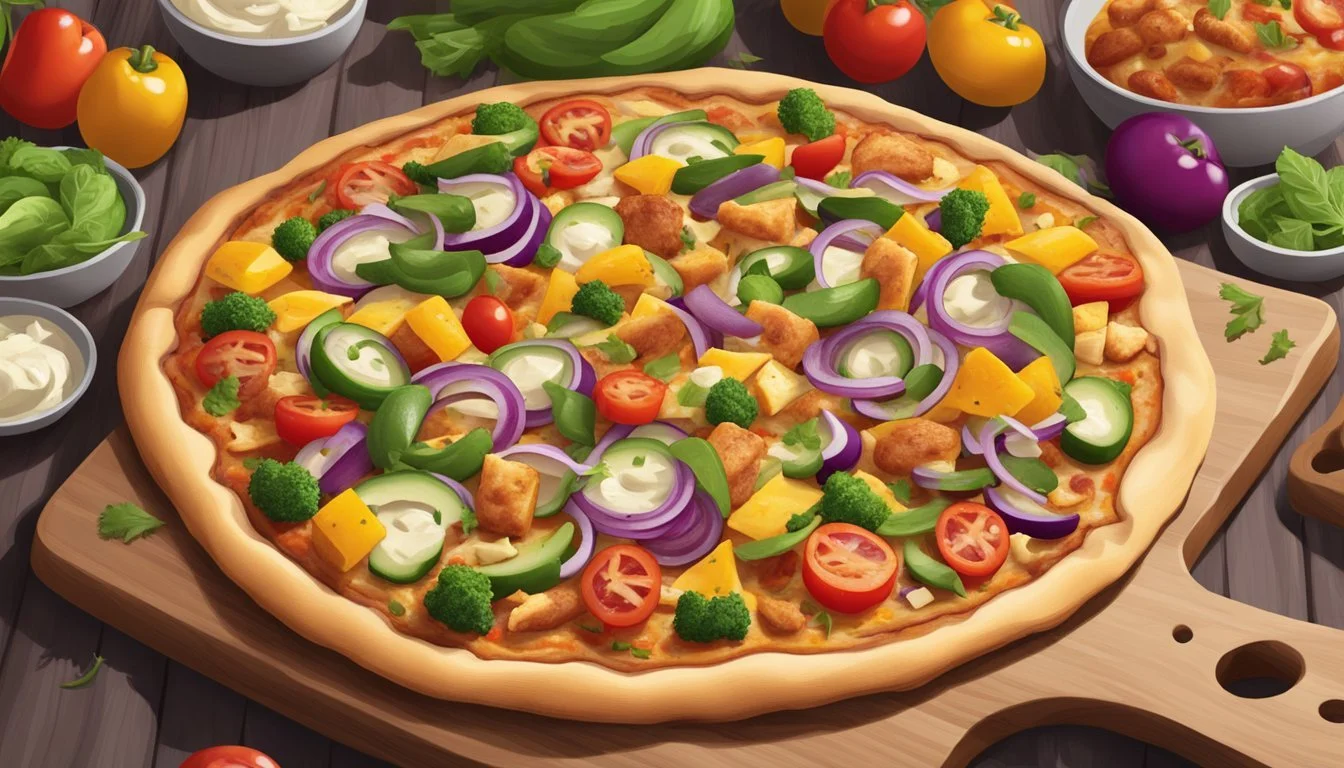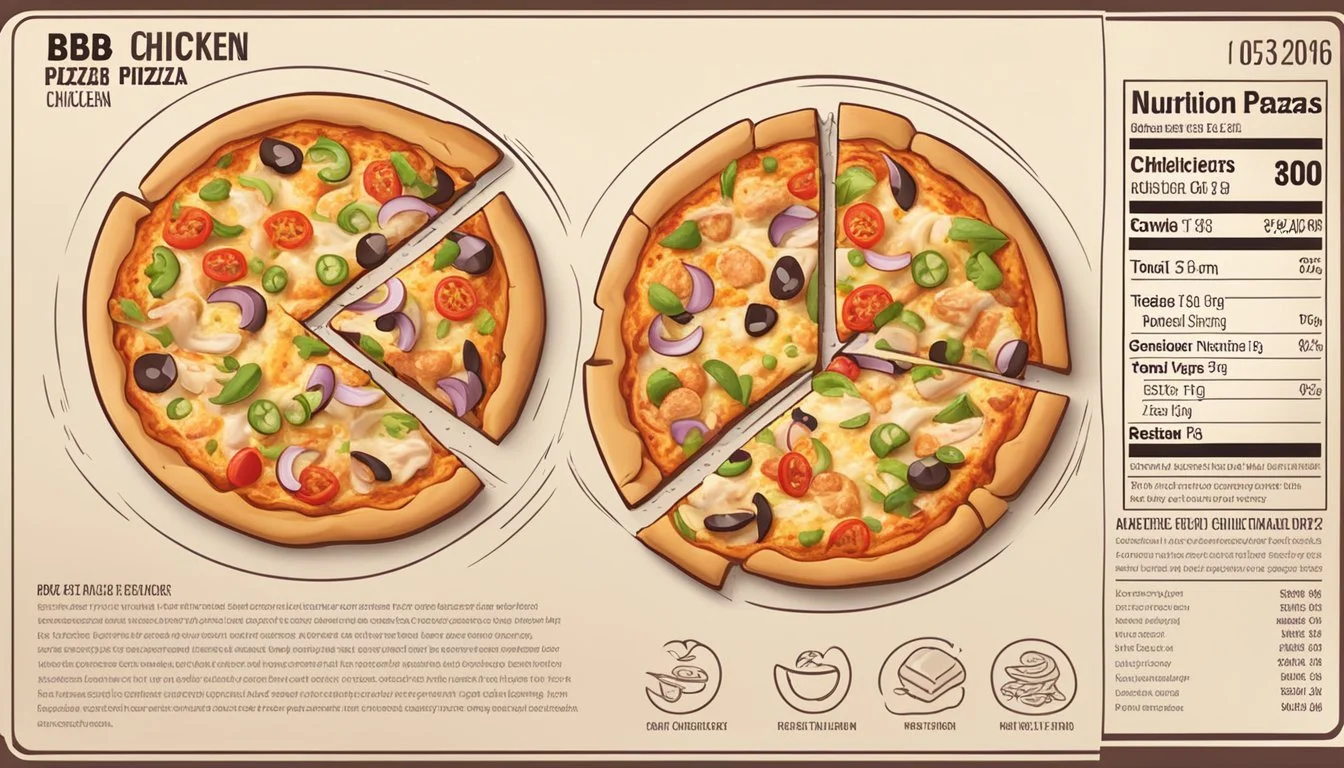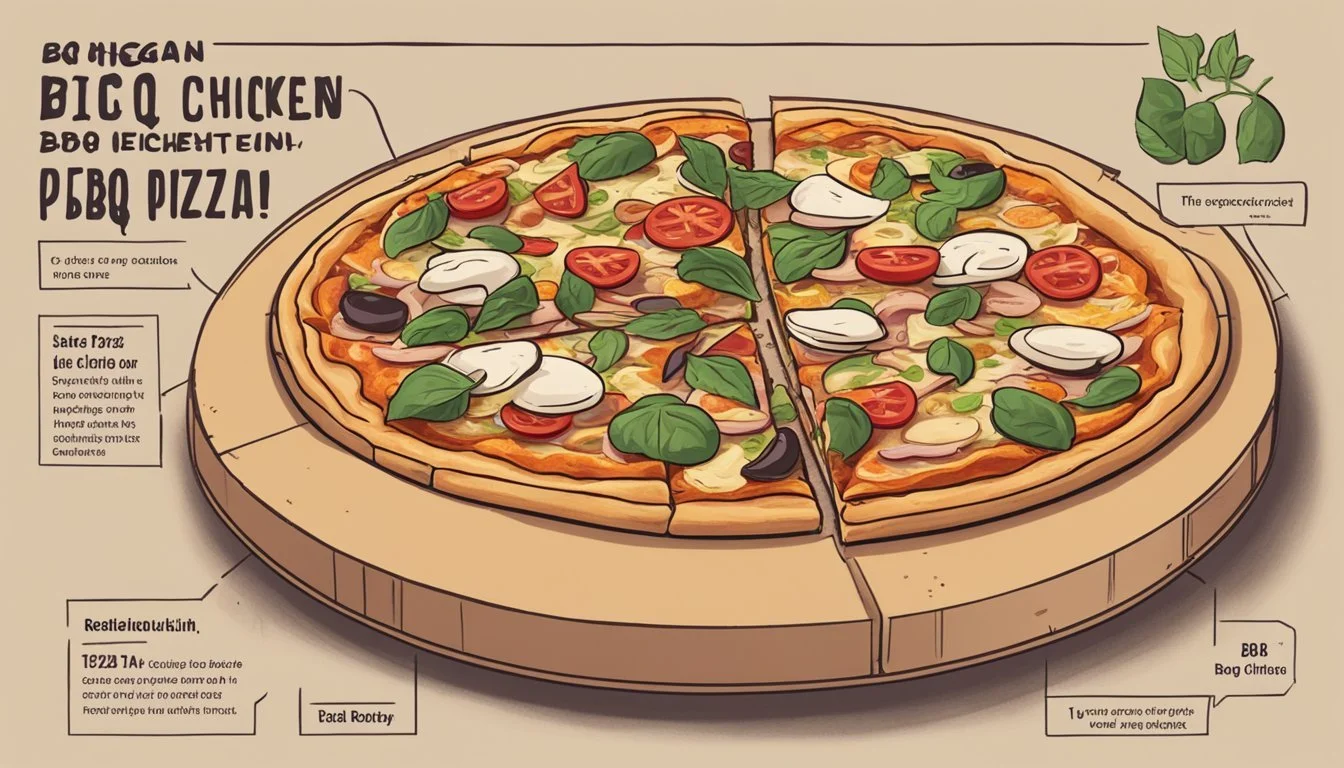Is BBQ Chicken Pizza Vegan?
Exploring Plant-Based Variations
BBQ chicken pizza, (What wine goes well with pizza?) a beloved staple in the world of American fast food, typically combines the smoky flavors of barbecue sauce with the savory taste of chicken, all spread generously over a cheese-slathered pizza crust. At first glance, this indulgent pizza variant might not seem compatible with a vegan diet, which excludes all animal products. However, the rise in plant-based eating has paved the way for inventive culinary adaptations that ensure even a BBQ chicken pizza can fit into a vegan lifestyle.
Vegan renditions of BBQ chicken pizza replace traditional chicken with plant-based substitutes such as soy curls, seitan (What wine goes well with seitan?) or specifically prepared tofu, all capable of absorbing the rich BBQ sauce that characterizes this dish. Vegan cheeses, made from nuts or soy, melt satisfyingly over the toppings, providing the stretchy, comforting experience expected from a classic pizza. The base of these pizzas, the crust, is often already vegan, made from a simple blend of flour, water, yeast, and salt, but careful consideration is given to ensure that no animal-derived ingredients are present.
The creativity in the vegan culinary world is evident when observing the array of vegan BBQ chicken pizzas available, some even incorporating additional vegetables like green peppers or spinach for added nutrients and flavors. The transformation of this traditionally non-vegan item into a plant-based delicacy demonstrates the versatility and adaptability of vegan cooking. Such innovations make it possible for those following a vegan diet to enjoy the rich, tangy flavors of BBQ chicken pizza without compromising their dietary choices.
Understanding Veganism
Veganism is a lifestyle choice centered around the use of plant-based products, avoiding all animal-derived ingredients, which can often encompass more than just food.
Vegan Diet Basics
A vegan diet consists exclusively of plant-based foods. This includes fruits, vegetables, grains, nuts, seeds, and legumes. Vegans do not consume derivatives of animal products, which extends to dairy, eggs, and honey. Veganism is both a dietary choice and a philosophy that seeks to exclude the use of animals for food, clothing, or any other purpose.
Key components of a vegan diet:
Proteins: from sources like beans, lentils, tofu, and tempeh.
Fats: obtained from nuts, seeds, avocados, and oils.
Carbohydrates: sourced from fruits, vegetables, whole grains, and some fortified breads and pastas.
Vitamins and minerals: especially those common in animal products, often supplemented or sourced from fortified foods.
Common Non-Vegan Ingredients
In assessing whether a product like BBQ chicken pizza is vegan, one must inspect ingredients that are commonly non-vegan.
Non-Vegan Ingredients to look out for:
Cheese: Typically made from cow's milk, but vegan cheese options are available and are often made from nuts or soy.
Meat: Inclusive of traditional chicken, but vegan chicken substitutes can be utilized, commonly made from seitan, tofu, or plant-based proteins.
Sauces: Some may contain animal-derived ingredients, like honey or anchovies (What wine goes well with anchovies?) in Worcestershire sauce, but there are vegan versions available.
Crusts: While many pizza crusts are vegan, some may contain dairy products like butter or eggs.
Products labeled as "vegan" should be entirely plant-based, free from animal-derived components, and suitable for those following a vegan lifestyle. Vegan cheeses and vegan chicken alternatives are frequently made from ingredients like coconut oil, nutritional yeast, almonds, and soy protein to mimic the textures and flavors of their non-vegan counterparts.
Components of BBQ Chicken Pizza
When crafting a BBQ chicken pizza, particularly a vegan variation, careful consideration is given to the selection of plant-based ingredients for the dough, sauce, and toppings to replicate the traditional flavors while adhering to vegan dietary preferences.
Pizza Dough Ingredients
Dough forms the base of any pizza, and for a Vegan BBQ Chicken Pizza, it typically consists of:
Flour: The foundation of dough, with all-purpose or bread flour most commonly used.
Water: To hydrate the flour and activate the gluten.
Yeast: For leavening, which helps the dough rise.
Salt: For flavor and to regulate yeast activity.
Sugar: Sometimes added as "food" for the yeast and to enhance browning.
Olive Oil: Adds richness and helps create a tender crust.
BBQ Sauce Composition
The BBQ sauce serves as a crucial component, giving the pizza its distinctive smoky-sweet flavor profile. It's composed of:
Tomato paste or ketchup: As the tangy base.
Vinegar: For acidity, often apple cider or white vinegar is used.
Sweetener: Such as brown sugar, molasses, or maple syrup for a sweet undertone.
Spices: Typically includes paprika, garlic powder, onion powder, and sometimes liquid smoke for an authentic barbecue flavor.
Adjustments: Vegan versions may omit ingredients like Worcestershire sauce, which often contains anchovies.
Topping Varieties
Vegan pizzas use a range of toppings to replicate the classic flavors and textures:
Vegan Chicken: Plant-based protein options like soy curls or seitan, often seasoned with BBQ sauce.
Vegan Mozzarella Cheese: Made from a variety of plant-based ingredients like nuts or soy.
Vegetables: Common toppings include corn, bell pepper, red onion, cilantro, and sometimes green pepper or onion for extra crunch and freshness.
Additional Flavors: Garlic, olive oil, and even a sprinkle of vegan cheese enhance the overall taste profile.
Assembling these components with care ensures a delicious and authentic Vegan BBQ Chicken Pizza experience.
The Art of Pizza Making
The process of crafting a pizza involves precise preparation of dough, careful layering of ingredients, and mastery of baking techniques. These components are crucial for creating a perfect pizza experience.
Preparing the Pizza Dough
To start with a solid foundation, one must gather high-quality baking flour, water, yeast, and a pinch of salt. The dough is the heart of the pizza, and its creation begins with activating the yeast in warm water to ensure a good rise. The flour and salt are then integrated, followed by drizzling in some olive oil to bring the dough together. After kneading it into a smooth, elastic ball, the dough must rest to allow the yeast to work its magic, resulting in a fluffy and workable pizza base.
Ingredients for Homemade Pizza Dough:
Baking Flour: 2 cups
Warm Water: 1 cup
Dry Yeast: 1 packet (2 1/4 teaspoons)
Salt: 1 teaspoon
Olive Oil: 2 tablespoons
Assembling Your Pizza
Once the dough has risen and been stretched out onto a baking sheet or pizza stone, the assembler may begin crafting their pizza. Starting with a base layer of sauce—whether it's a traditional tomato or a smoky BBQ sauce—the foundation is then topped with an array of ingredients. The toppings may include slices of vegan BBQ chicken, dairy-free cheese, and a variety of vegetables like bell peppers and onions.
Layers for Assembling Your Pizza:
Sauce: Tomato or BBQ (spread evenly)
Cheese: Vegan mozzarella or other dairy-free alternatives
Toppings: Vegan BBQ chicken, green peppers, onions, etc.
Baking Techniques
To ensure the pizza cooks evenly, preheating the oven is essential. The temperature and timing can vary, typically around 425°F to 475°F, for a period that ranges from 12 to 15 minutes depending on the size and thickness of the dough. The goal is a golden-brown crust and a thoroughly melted cheese topping. Monitoring the pizza during the baking process is key to avoiding any overcooking or uneven browning.
Baking Conditions:
Preheat Oven: Between 425°F and 475°F
Bake Time: 12-15 minutes (based on dough size and oven)
Final Check: Crust should be golden-brown, and cheese should be melted completely
Vegan Substitutes for BBQ Chicken Pizza
A successful vegan BBQ chicken pizza relies on carefully selected alternatives for cheese, chicken, and BBQ sauce that maintain the dish's beloved flavors and textures.
Vegan Cheese Options
Vegan Mozzarella Cheese: One of the most popular options for vegan cheese on a BBQ chicken pizza is vegan mozzarella. Brands often use a combination of oils, nut milks, and starches to replicate the melt and stretch of traditional mozzarella.
Cashew-Based Cheeses: Cashews are a common base for creamy and rich vegan cheeses that can add a delightful flavor profile to the pizza.
Soy-Based Cheeses: These cheeses offer a good melt and are readily available in most grocery stores.
Plant-Based Chicken Alternatives
Plant-based chicken has made significant strides in texture and flavor, providing vegans with an array of options for their BBQ pizza topping.
Seitan Chicken: Seitan, made from wheat gluten, offers a chewy texture reminiscent of chicken and is excellent at absorbing BBQ flavors.
Soy Curls: These dehydrated strips made from whole soybeans rehydrate to mimic the texture of shredded chicken when coated with BBQ sauce.
Vegan Chicken Strips: Many brands offer pre-flavored vegan chicken strips that can be used directly on the pizza.
Homemade Vegan BBQ Sauce
Creating a homemade BBQ sauce ensures control over the ingredients, making it easy to keep the sauce vegan while tapering the flavors to one's preference.
Basic Ingredients: A combination of ketchup, vinegar, sweetener (like sugar or maple syrup), and spices such as smoked paprika and garlic powder can be simmered to craft a tangy and smoky sauce.
Customization: Adding liquid smoke or vegan Worcestershire sauce can deepen the complexity of the BBQ sauce.
Nutritional Information
Traditional BBQ chicken pizza is not vegan due to its cheese and chicken toppings, both of which are animal-based products. A vegan BBQ chicken pizza, however, substitutes these with plant-based alternatives. When considering its nutritional profile, it is essential to look at the specific ingredients used.
Calories: A vegan BBQ chicken pizza might have slightly fewer calories than its non-vegan counterpart. Calories can vary widely depending on the choice of toppings and the type of vegan cheese and chicken used. For instance, a serving might contain around 170 calories or more.
Protein-Packed: Vegan chicken alternatives are usually protein-packed, often made from soy, seitan, or other plant proteins. Nutritional yeast, a common topping, also provides additional protein and a cheesy flavor while being rich in B-vitamins.
Carbohydrates: The pizza crust accounts for a significant portion of carbohydrates. Whole grain crusts can provide more fiber and nutrients than refined flour crusts. Toppings like BBQ sauce also contribute to the carbohydrate content.
Nutrients Approximate Value* Calories 170+ kcal Total Fat Variable Saturated Fat Variable Protein High Carbohydrates Variable Dietary Fiber Depends on crust
*Values are approximate and can vary based on recipe adjustments.
Nutritional Yeast: Used as a cheese flavor substitute, nutritional yeast is a significant source of B-complex vitamins and trace minerals. It is naturally low in fat and sodium, making it a healthy addition.
High Protein: Vegan meats have come a long way in replicating the texture and protein content of chicken, allowing for a high-protein vegan pizza topping. Paired with vegan cheese, which may be made from nuts or soy, contributes additional protein, creating a satisfying meal option with well-rounded nutritional content.
Dining and Consumer Choices
When it comes to vegan dietary preferences, consumers have a variety of options for enjoying BBQ chicken pizza both in restaurants and from grocery stores.
Restaurant Options
Many restaurants now cater to vegan diets, offering plant-based versions of popular dishes. One significant player is California Pizza Kitchen, which has responded to the growing demand for plant-based dishes. This popular chain offers a vegan BBQ Chicken Pizza, staying true to its classic flavors while accommodating vegan patrons. At restaurants such as California Pizza Kitchen, consumers can readily enjoy their favorite BBQ chicken pizza with ease, simply by specifying their dietary preference.
Grocery Store Finds
Grocery stores have also expanded their selections to include vegan-friendly alternatives. Whole Foods Market is known for its commitment to diverse dietary needs and offers a selection of vegan pizza options, including BBQ chicken-style pizzas made with vegan ingredients. Brands like Follow Your Heart provide vegan cheese, a popular topping choice for homemade pizza connoisseurs. Customers at grocery stores can purchase individual ingredients to create their custom vegan BBQ chicken pizza:
Vegan Cheese: Various brands like Follow Your Heart offer dairy-free cheese alternatives.
Plant-Based Chicken: Meatless chicken substitutes suitable for BBQ flavoring.
Sauces and Condiments: Vegan BBQ sauces to replicate the classic barbecue chicken taste.
Crusts and Doughs: Ready-to-bake pizza crusts that are vegan-friendly.
By visiting a grocery store or a restaurant with vegan options like California Pizza Kitchen, those who follow a vegan lifestyle won't have to compromise on taste when craving a BBQ chicken pizza.
DIY Vegan BBQ Chicken Pizza
Creating a vegan BBQ chicken pizza at home is a rewarding endeavor that allows for full control over ingredients, ensuring a delicious and cruelty-free meal. The following step-by-step recipe provides a straightforward approach, while the customization ideas section offers suggestions to tailor the pizza to individual tastes.
Step-by-Step Recipe
Ingredients:
1 pre-made vegan pizza dough or homemade dough
1/2 cup vegan BBQ sauce, plus more for coating
1 cup vegan chicken strips or shredded pieces (soy or wheat-based)
1 cup vegan mozzarella cheese shreds
1/2 red onion, thinly sliced
1 green pepper, sliced
Olive oil for cooking
Preparation:
Preheat the oven to 475 degrees F (245 degrees C).
Coat a 10-inch cast iron skillet with olive oil and heat over medium-high.
Cooking the Vegan Chicken:
Toss vegan chicken in enough BBQ sauce to coat.
Place the chicken in the skillet and cook until browned, about 7-12 minutes.
Assembling the Pizza:
Stretch out the pizza dough to fit the skillet or baking sheet.
Start with a base layer of BBQ sauce, followed by vegan cheese.
Add the cooked vegan chicken, red onion, and green pepper.
Baking:
Bake in the preheated oven for about 15 minutes or until the crust is golden and cheese has melted.
Allow the pizza to cool for 5 minutes before slicing.
Customization Ideas
Cheese Options: Experiment with different types of vegan cheese, such as cheddar or gouda, to find the perfect melt and flavor for your pizza.
Toppings Variety: Additions like corn, spinach, or sliced tomatoes can introduce new textures and tastes.
Sauce Swaps: Try different BBQ sauce varieties, or mix BBQ with a little vegan ranch or buffalo sauce for a unique twist.
Crust Alternatives: For those seeking a healthier option, whole wheat or gluten-free pizza crusts can be used.
Additional Proteins: Include other vegan proteins like tempeh or tofu to diversify the protein sources on your pizza.
Remember, a DIY vegan BBQ chicken pizza is a quick and easy meal that can be made to suit any palate, ensuring a satisfying homemade recipe every time.
Food Presentation and Social Sharing
When it comes to vegan BBQ chicken pizza, presentation is key for social sharing. A well-presented pizza not only tempts the taste buds but also becomes a visual delight, making it perfect for sharing on social media platforms like Instagram and Pinterest. A colorful arrangement of toppings—golden corn, diced green peppers, and red onions—on a golden-brown crust creates an aesthetic that invites engagement in the form of likes, comments, and shares.
Photo Quality: High-resolution photos with good lighting can make vegan BBQ chicken pizza look mouthwatering.
Plating Tips: Pizza should be evenly sliced, and a few slices can be slightly pulled apart to showcase the gooey vegan cheese and evenly distributed toppings.
Social media users often look for inspiration on platforms such as Instagram and Pinterest. They might comment on the photo, asking for the recipe or tips on how to achieve the same presentation. The ability to share visually appealing images of vegan dishes can also encourage others to try plant-based options, expanding the community of vegan food enthusiasts.
Captions and Hashtags: A concise, informative caption along with relevant hashtags can increase visibility. Example hashtags include:
#VeganBBQChickenPizza
#PlantBasedEating
#FoodPresentation
#VeganPizzaNight
Inclusivity: Sharing images of vegan BBQ chicken pizza caters to a diverse audience interested in veganism, healthy eating, or simply looking for a delicious pizza alternative. By posting these images, one can foster a sense of community and interaction among food lovers.
Storage and Reheating Guidelines
For those who opt for vegan BBQ chicken pizza, proper storage and reheating techniques are crucial to maintain the quality of this plant-based delight.
Storage: Vegan BBQ chicken pizza should be stored in an airtight container to preserve its freshness. Here are easy-to-follow steps:
Let the pizza cool to room temperature.
Place it in a container that seals tightly.
Refrigerate for up to 3 days.
If dealing with premade pizza dough, any unused portion should be wrapped securely in plastic wrap or placed in a sealed bag. Store it in the refrigerator and use within the dough's recommended shelf life, typically a few days.
Reheating:
Reheating pizza can be done in an oven or toaster oven for optimal results. To reheat:
Preheat the oven to 350°F (175°C).
Place the pizza on a baking sheet.
Reheat for 5-10 minutes or until heated through and the vegan cheese is soft.
Toaster Oven:
Use similar temperature settings.
Monitor to prevent burning due to the faster heating element.
Microwave is not recommended, as it can make the crust soggy.
Reheating Table:
Method Temperature Time Oven 350°F 5-10 min Toaster Medium 3-5 min
By following these guidelines, they can ensure their leftovers are just as enjoyable as when first baked, providing the pleasure of vegan pizza with the convenience of quick preparation.
Vegan Lifestyle Advocacy
Adopting a vegan lifestyle reflects a commitment to animal welfare, environmental sustainability, and personal health. Advocates of the vegan lifestyle are often knowledgeable about the implications of their dietary choices and confidently share information to encourage others to consider plant-based options.
Education plays a pivotal role in vegan advocacy. Advocates provide resources and facts about how vegan diets can conserve resources and reduce one's carbon footprint. This advocacy is powered by a deep understanding of how animal-free products are beneficial to both the environment and individual well-being.
Health benefits are frequently highlighted by proponents, as a balanced vegan diet can be rich in essential nutrients while reducing the risks associated with consuming animal products. This includes lower levels of saturated fat and a reduction in the likelihood of developing heart disease, diabetes, and certain cancers.
For those considering a transition to veganism, supporters offer guidance on nutritional balance, ensuring their diet includes a wide variety of:
Fruits and vegetables
Whole grains
Nuts and seeds
Legumes
Plant-based proteins
The ethics of food choices also form a core component of vegan advocacy. They elucidate the ethical implications of abstaining from animal products, not just in food but in all aspects of consumption, advocating for a lifestyle that aligns with values of compassion and non-violence.
Community support is essential for many as they navigate this shift. Vegan communities provide encouragement and share resources such as recipes, which often incorporate imaginative plant-based alternatives to traditional dishes, including BBQ chicken pizza, utilizing ingredients such as soy curls or seasoned jackfruit to replicate the texture and flavor of chicken.











